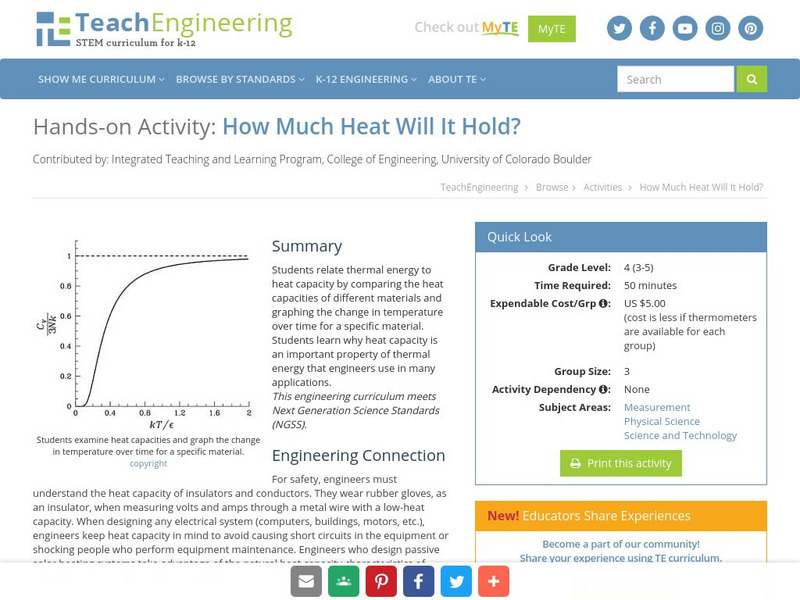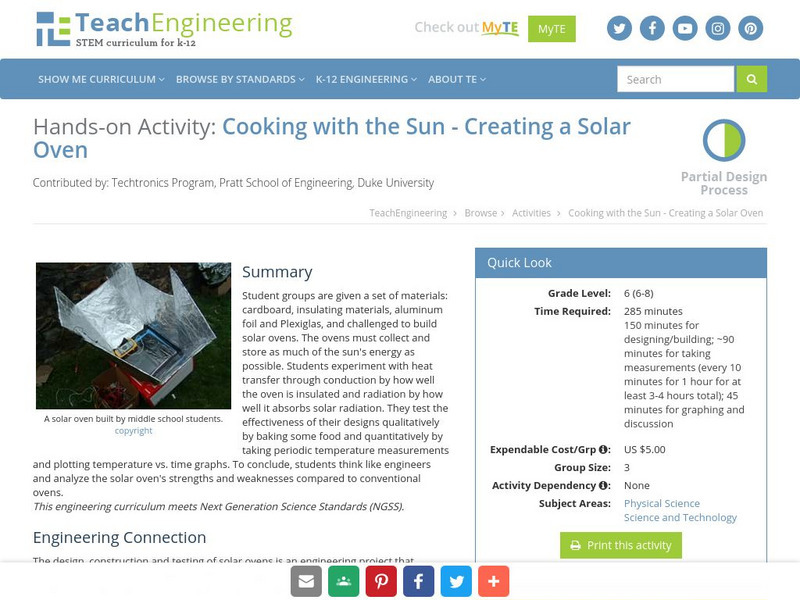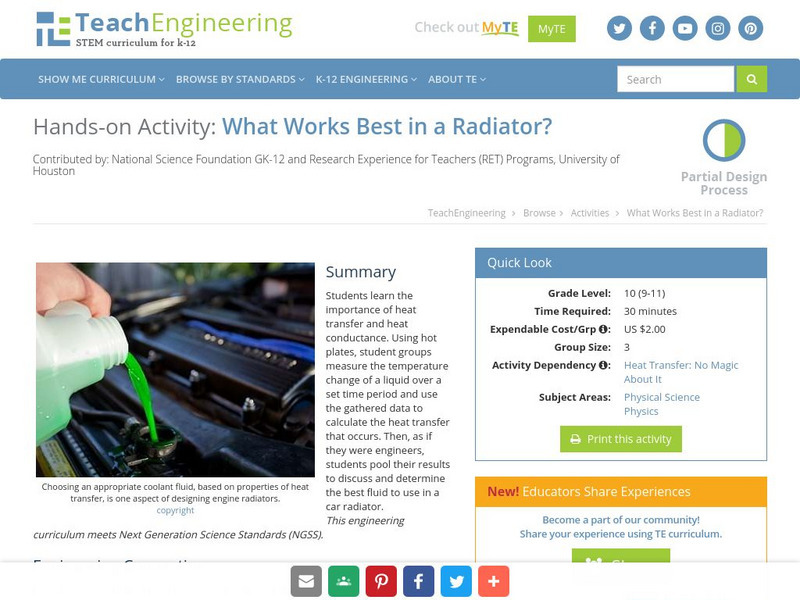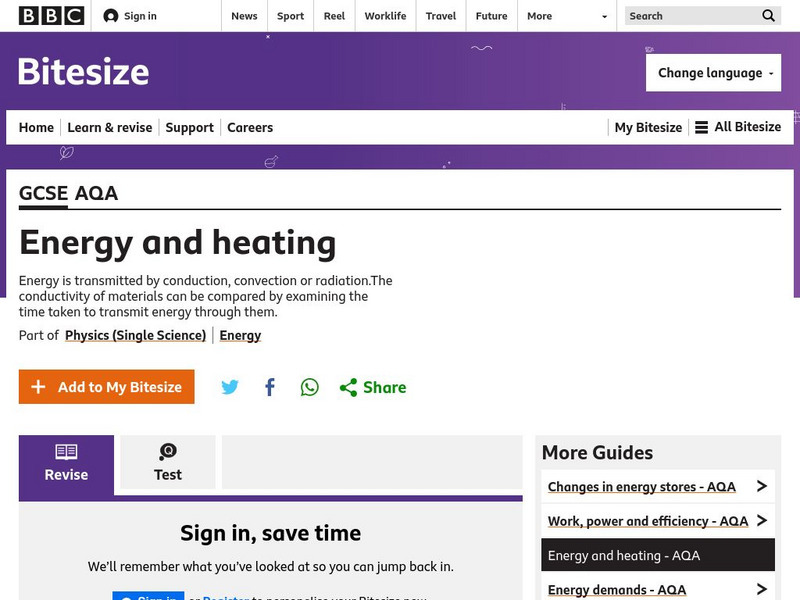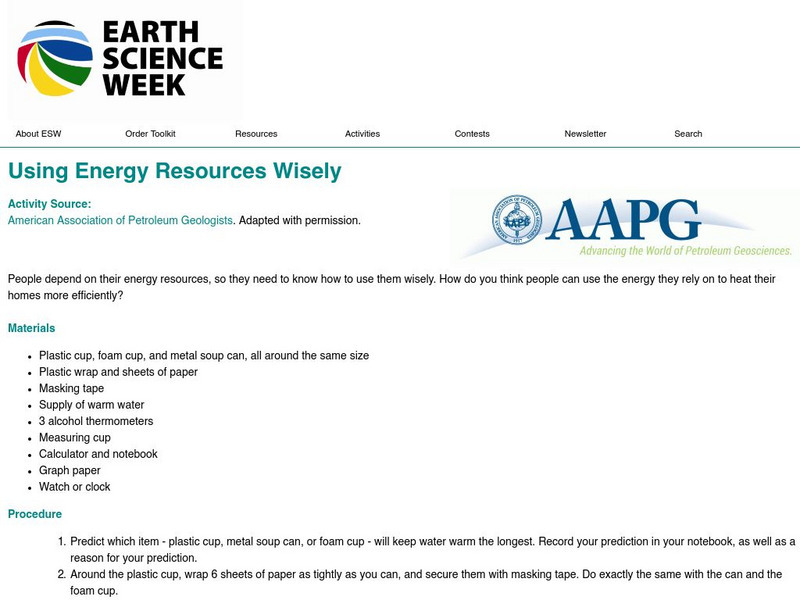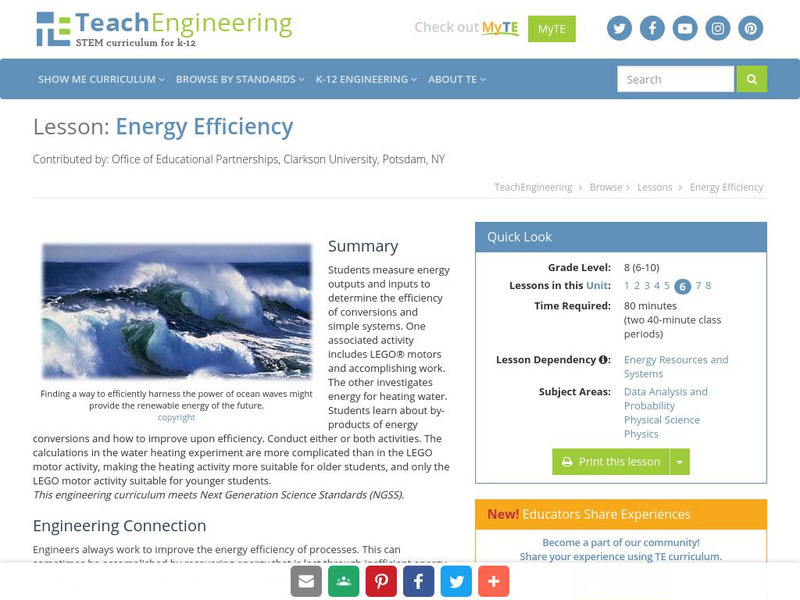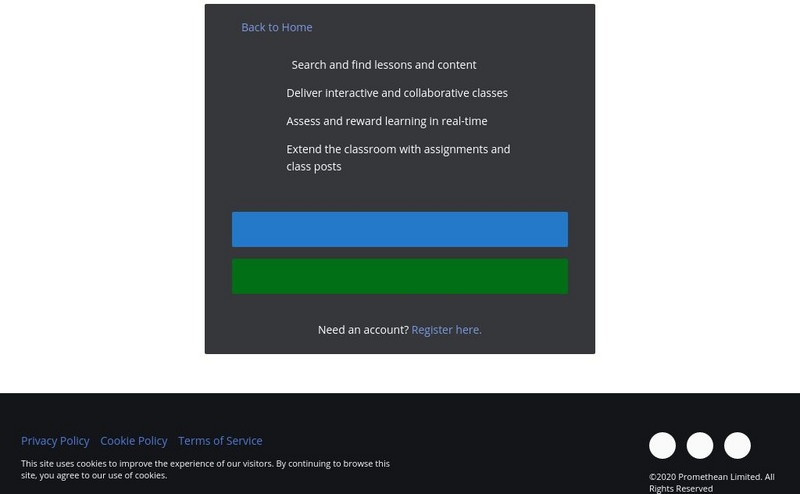Science and Mathematics Initiative for Learning Enhancement (SMILE)
Smile: Passing the Heat Along
This lesson plan explores the way heat passes--transfers--through various conductors.
Better Planet Productions
Earth Care: Where's the Heat? [Pdf]
Middle schoolers will work alongside the school caretaker to determine ways in which their school loses heat, and learn about strategies that can reduce or prevent this.
TeachEngineering
Teach Engineering: How Much Heat Will It Hold?
Students relate thermal energy to heat capacity by comparing the heat capacities of different materials and graphing the change in temperature over time for a specific material. Students learn why heat capacity is an important property...
TeachEngineering
Teach Engineering: Cooking With the Sun Creating a Solar Oven
For this activity, students will be given a set of materials: cardboard, a set of insulating materials (i.e. foam, newspaper, etc.), aluminum foil, and Plexiglas. Students will then become engineers in building a solar oven from the...
TeachEngineering
Teach Engineering: Zero Energy Housing
Students investigate passive solar building design with a focus solely on heating. They learn how insulation, window placement, thermal mass, surface colors, and site orientation play important roles in passive solar heating. They use...
TeachEngineering
Teach Engineering: Keep It Hot!
Student teams design insulated beverage bottles in this challenge, and test them to determine which materials work best at insulating hot water to keep it warm for as long as possible.
TeachEngineering
Teach Engineering: What Works Best in a Radiator?
Students learn the importance of heat transfer and heat conductance. Using hot plates, student groups measure the temperature change of a liquid over a set time period and use the gathered data to calculate the heat transfer that occurs....
OpenStax
Open Stax: College Physics: Conduction
In this section of the textbook, learn about how heat is transferred by conduction. Section explores how to calculate thermal conductivity and studies the thermal conductivities of common substances. Also included are problems with...
TeachEngineering
Teach Engineering: Conduction, Convection, and Radiation
With the help of simple, teacher-led demonstration activities, students learn the basic concepts of heat transfer by means of conduction, convection, and radiation. Students then apply these concepts as they work in teams to solve two...
BBC
Bbc: Gcse Bitesize: Energy and Heating
Energy is transmitted by conduction, convection or radiation.The conductivity of materials can be compared by examining the time taken to transmit energy through them. This lesson explains how conduction works and provides a link to a test.
Science Education Resource Center at Carleton College
Serc: How Much Energy Do You Save by Doubling Insulation?
Students use the governing equation for steady state heat transfer across a surface to explore the effect of changing the insulation value on the amount of energy used.
BBC
Bbc Schools: Ks2 Bitesize: Science: Materials: Keeping Warm
Easy-to-understand overviews, with illustrations, a game, and quiz questions, about thermal conductors and insulators.
American Geosciences Institute
American Geosciences Institute: Earth Science Week: Using Energy Resources Wisely
Students test which type of material retains heat the longest.
PBS
Pbs Kids: Conduction Countdown
PBS offers an experiment that kids can do at home to learn more about heat conduction and how it works.
CK-12 Foundation
Ck 12: Physical Science: Heat Conduction
[Free Registration/Login may be required to access all resource tools.] Investigates what conduction is, how it works, and gives examples of conduction.
TeachEngineering
Teach Engineering: How Hot Is It?
Students learn about the nature of thermal energy, temperature and how materials store thermal energy. They discuss the difference between conduction, convection and radiation of thermal energy, and complete activities in which they...
Georgia State University
Georgia State University: Hyper Physics: Heat Conduction
Using understandable words and exceptional graphics, this page describes the transfer of energy by means of conduction. Contains several links to related topics.
TeachEngineering
Teach Engineering: Energy Efficiency
Students measure energy outputs and inputs to determine the efficiency of conversions and simple systems. One associated activitiy includes Lego motors and accomplishing work. The other investigates energy for heating water. Students...
Georgia State University
Georgia State University: Hyper Physics: Thermal Conductivity
Lists thermal conductivity values for a variety of topics. The link "Heat conduction discussion" on this page displays an equation for calculating the rate of thermal conduction using these conductivity values.
ClassFlow
Class Flow: Keeping Warm
[Free Registration/Login Required] Through this unit children build their ideas about temperature as a measure of how hot or cold objects are and learn about thermal insulators as materials that can help to keep things warm or cool.
OpenSciEd
Open Sci Ed: 6.2 Thermal Energy
This Thermal Energy unit has students investigating two ways to transfer energy into a drink: (1) the absorption of light and (2) thermal energy from the warmer air around the drink. They are then challenged to design their own drink...
Texas Instruments
Texas Instruments: Subnivean Comfort
Students measure and compare air temperatures inside and outside a snow shelter. If students choose to sleep in the shelter overnight they use the temperature measurements to confirm what they discover experientially- that snow is a...
University Corporation for Atmospheric Research
Ucar: Learn: The Greenhouse Effect
A detailed overview of the greenhouse effect, with explanations about Earth's atmosphere gases referred to as greenhouse gases, and the factors that influence the heat-trapping ability of a greenhouse. All information is reinforced...



![Earth Care: Where's the Heat? [Pdf] Lesson Plan Earth Care: Where's the Heat? [Pdf] Lesson Plan](https://d15y2dacu3jp90.cloudfront.net/images/attachment_defaults/resource/large/FPO-knovation.png)

